Mathias Dieth on Dirkschneider And The Old Gang: “We’re working on a full album, and we’ve already done some recordings”
Mathias Dieth is a German guitarist best known for his work with the heavy metal band U.D.O. Before joining U.D.O., he played in bands such as Gravestone and Sinner. With U.D.O., he released four albums: “Animal House” (1988), “Mean Machine” (1989), “Faceless World” (1990), and “Timebomb” (1991). The band split up in 1991, and after that, Dieth left the professional music scene to study law.
Dieth transitioned into a successful legal career and is now a practicing lawyer with expertise in media, culture, copyright, and commercial legal protection. Recently, he has also participated in several musical projects, including DATOG (Dirkschneider And The Old Gang), the reunited Gravestone, and his new band, Tiffany Kills.
Last February, Dieth was invited to Helsinki, where he first performed as a special guest for U.D.O. Later that same evening, he played a full set of U.D.O. classics with the local act Metal Machinery at the ‘Into the Night’ event. I had the honor of meeting the man one day before the shows, and here’s the summary of our long and interesting chat.
RETURN TO FINLAND AND JOINING U.D.O. IN THE 80’s
Mathias, first of all, welcome back to Finland after all these years. I believe it’s been over 30 years since your last visit here.
Yes, thank you very much, Marko. Thank you for inviting me. It feels great to be back in Finland. I cherish the memories from our U.D.O. days. If you inquire about the very last time, it was the Hämeenlinna show in 1991—about 33 years ago. That concert marked the end of the old U.D.O. era, as we split after the show.
You have an interesting connection to Finland because after you had joined the band, U.D.O. played one of its first shows in Finland, at the Kuusrock -festival in Oulu.
Mathias Dieth: Yes, that was a summer festival. I remember that well.
Do you have any special memories from that show?
Mathias Dieth: My memory tells me that this was a big festival and there were so many friendly people, Finnish people, and there were also a lot of people from other Scandinavian countries. I don’t know why, but they were really into Udo and U.D.O., and they really went crazy. It was the first time I experienced something like that. They shook the bus when we entered the festival area. And I thought, what the hell, are we the Beatles, or what was going on here? That was great and a bit scary, but we loved it.
It was one of the first shows you played with the band, and U.D.O. was a new band back then. Your debut album “Animal House” had just been released, and it was quite successful, but at the same time, you went through lineup changes. What kind of memories do you have from those early days when you were still taking baby steps with the band?
Mathias Dieth: I only have good memories from that time. It was not like a fully established band. It was more like Udo, and some German musicians gathered around him. He had a promising start supported by his old Accept colleagues, who provided him with all these songs for the first album, “Animal House.” When I joined the team—well, I hesitate to call it a band at that point—it felt more like a cohesive team than a traditional band. The groundwork for the record was already laid out. I simply stepped into the studio and developed and played my parts. The recordings had already started when I came into the studio because some contractual issues had to be solved in advance, so I was pretty late. After the recordings were done and the album was complete, Udo made the decision to part ways with the two Warlock musicians, Peter Szigeti and Frank Rittel. I’m still not sure why, but then we needed to find new band members. Then came the nerve-wracking moment of our first shows. Udo had spent so much time with Accept, and they knew each other’s stage presence, their playing and acting, inside out. They had been like a well-oiled machine. I remember those initial shows; we were all on edge, and things didn’t go exactly as Udo had envisioned. But we grew, learned, and improved quickly. Confidence gradually settled in.
Before you were asked to join U.D.O., how familiar you were with Accept?
Mathias Dieth: I first heard “Breaker” in 1981 when I was around 16 or 17. A friend played the album for me, and I was blown away by the intense music, Udo’s voice, and the powerful melodies. It was incredible to discover this German band. I loved it. Later, “Restless and Wild” came out, and one of my bandmates from Gravestone introduced me to it. The twin guitar solo in “Fast as a Shark” left an everlasting impression. I was an Accept fan—I attended their concerts, including the ‘Metal Heart’ tour. I sat in the fifth or sixth row, inspired by the thought that I could achieve something similar. Their music motivated me to learn and create. Interestingly, you can detect some Accept influences in Gravestone’s songs.
I was always a huge Accept fan, and my favorite album is “Metal Heart.” I still recall the first time I heard the title track on the radio.
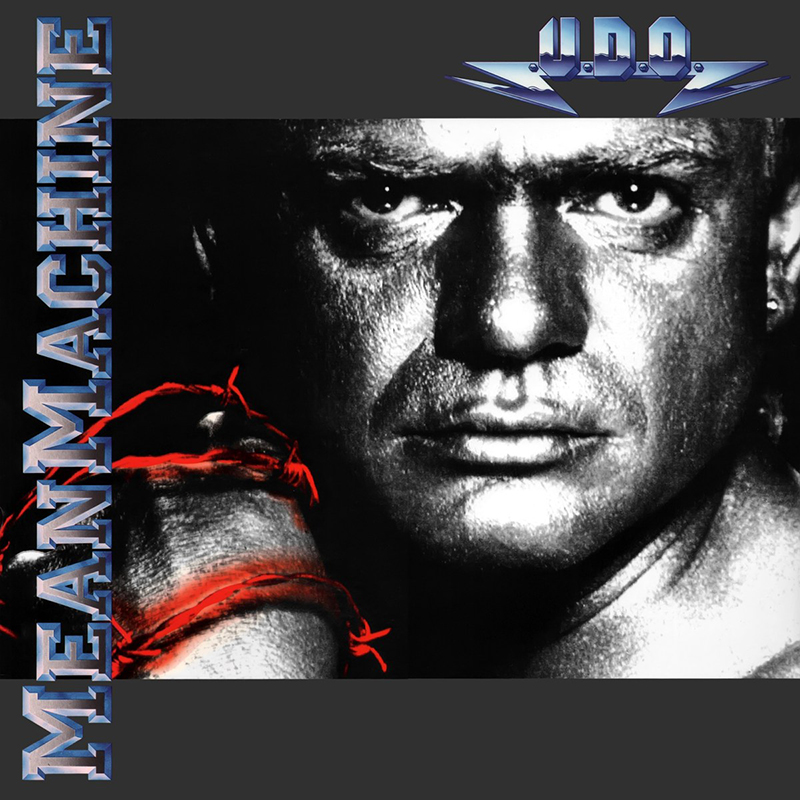
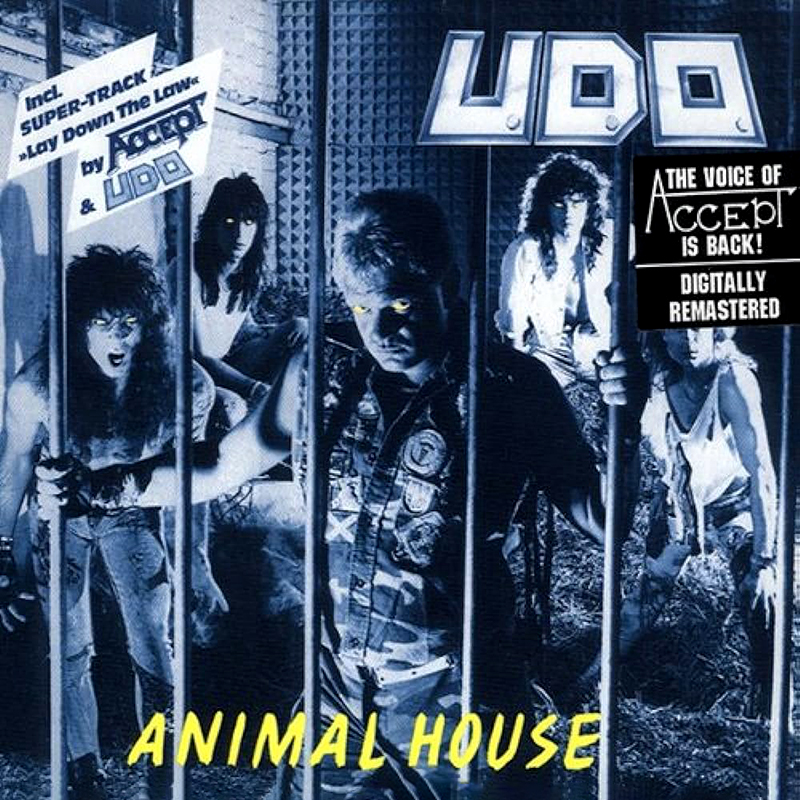
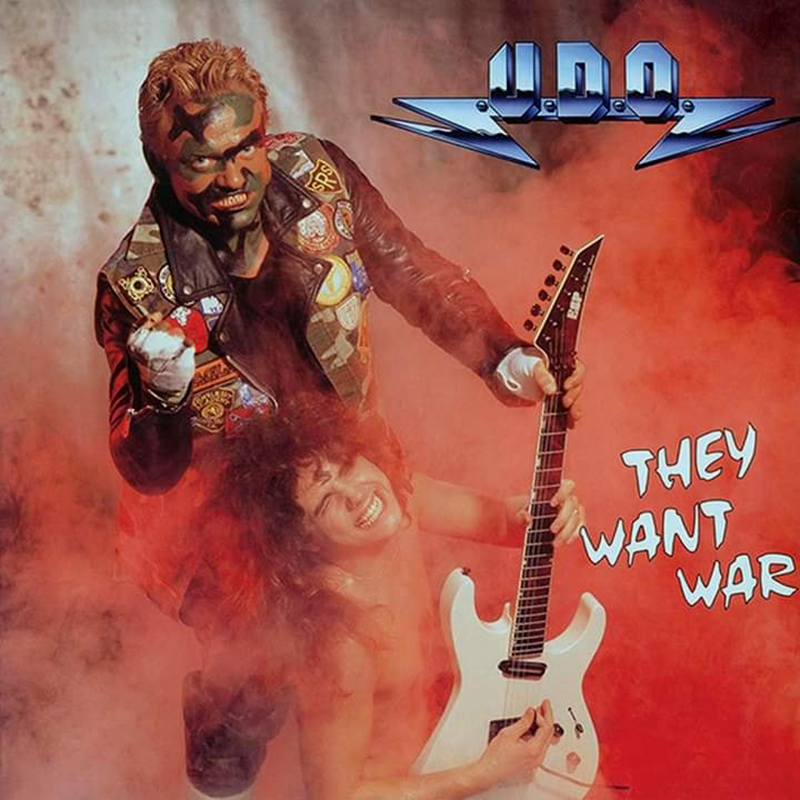
MEAN MACHINE AND THE OZZY TOUR
When you started to work on the second U.D.O. album, ‘Mean Machine,’ it must have been quite a different experience from the first one. You had a stable lineup and plenty of experience playing together as a band.
Mathias Dieth: That experience was different, especially because now we had to compose our own songs. We hadn’t yet proven that we could write specifically for U.D.O., considering Udo’s unique vocal requirements. He couldn’t just sing anything—there were certain constraints. Stefan Kaufmann shared insights about Udo’s vocal range, and we had to take that into account when crafting riffs, melodies, and other elements. Fortunately, it turned out quite well. “Mean Machine” remains an album I’m very proud of, and even now, years later, I occasionally listen to it. We made this album together, and we three, Andy, Udo, and me, wrote all the songs. There were always, this is something important, the Accept guys in the background, backing up Udo. When Udo was unsure about things if he was thinking, ‘Is this song good or not?’, he always had Stefan or Peter (Baltes) to call, and they shared their thoughts and kind of advised him, like ‘Yes, you could do that, ‘‘Maybe you should not.’ This is what I can remember. It was not only Udo, but there was also always this Accept connection behind, which was quite beneficial for us at that time. However, Wolf Hoffmann was never there. I know Wolf and like him, and we get along well together, but he is a bit different than the others.
After “Mean Machine” was released, U.D.O. embarked on its biggest tour, supporting Ozzy Osbourne on his European tour. You probably have some great memories from that tour.
Mathias Dieth: This was in 1989—decades ago—when we were supporting Ozzy Osbourne on a whole European tour. Yes, I met Zakk Wylde for the first time. It was the first tour Ozzy did with Zakk Wylde. We made friends with Zakk, and we had some great memories. Sometimes, we even did the soundcheck for them because they couldn’t make it to the venue on time. Sometimes, Ozzy had his issues, as everybody knows, and some evenings it was the question, ‘Will he show up or not?’ I remember using Zakk Wylde’s gear to do his soundcheck, and I had to sit on a case because he is so tall, and his guitar was hanging lower than my knees. There were fantastic memories. The first show was in Helsinki on the Ozzy tour. Were you there?
Yes.
Mathias Dieth: How old were you then?
I think I was 15 or 16 then.
Mathias Dieth: Yes, I was a bit older then. I recall a particular event. We accidentally met Ozzy all alone the night before the first show at a disco in Helsinki. It was quite interesting because he initially couldn’t be recognized, I would say. I thought, ‘Oh my God, it’s Ozzy, and we have to look out for him because we’re the support band.’ If we entered the same disco where he had just been thrown out—for reasons unknown to me—we’d likely face challenges in the coming days. Surprisingly, it was easy to get along with those guys, and they were very friendly. We had a wonderful time.
Did U.D.O. have opportunities to play shows with Ozzy outside of Europe as well?
Mathias Dieth: No, there wasn’t an offer like that. The record company wasn’t willing to cover our costs or anything similar. However, we did play with Guns N’ Roses in the United States in ‘88, and it was a wonderful experience. They were incredibly young, having just released their debut album, “Appetite for Destruction”. For us Europeans, accustomed to classical European metal, their sleaze glam rock attitude was uncharted territory. It was fascinating. I distinctly remember our first show with Guns N’ Roses. When I saw them on stage, my initial thought was, ‘What kind of nonsense is this?!’ I didn’t quite grasp their glam and sleazy rock’n’roll style. But after two or three shows, it became clear to me that they were musical geniuses, even if their approach seemed unconventional to me. Their rock and roll attitude was very different from what we were used to in Germany or Europe at that time.
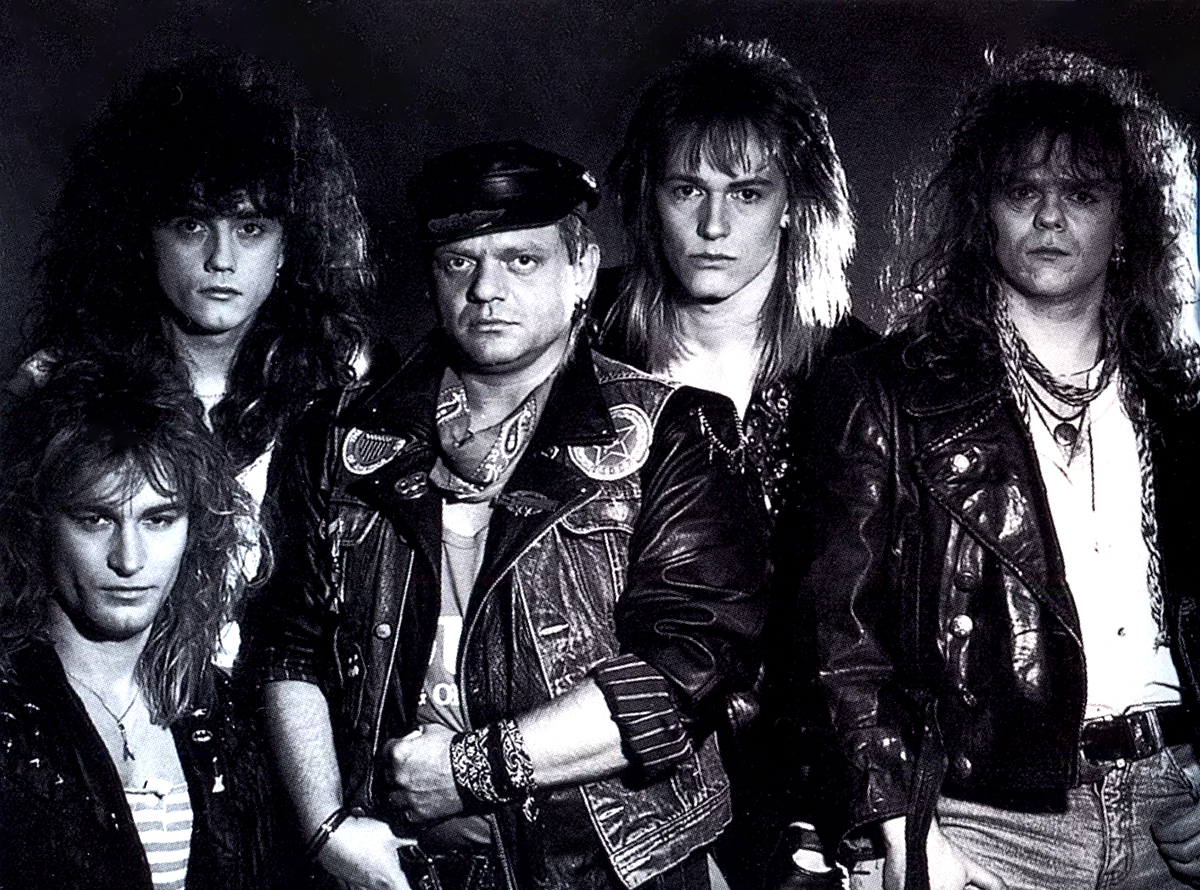
EAT THE HEAT AND DAVID REECE
One amusing memory stands out from the time when U.D.O. was recording ‘Mean Machine.’ David Reece had recently joined Accept. And when I interviewed him a few years ago, he mentioned that Accept was recording ‘Eat the Heat’ in the same studios where you were working on ‘Mean Machine.’ As a result, you ended up spending quite a lot of time together, and there was no bad blood etc., between the bands at all.
Mathias Dieth: Yes, and of course, we spent a lot of time together. That’s when I met Peter Baltes and Wolf Hoffmann in person for the first time. And I’d still consider Stefan Kaufmann a good friend. And Peter Baltes, I see him more often now during our work on the Dirkschneider And The Old Gang project. It felt like a big family. They were doing their thing, and we were doing ours. They helped us because we were young and inexperienced in certain ways. There was one wildcard in the mix— David Reece, who was somewhat lost in the German countryside near Pulheim at the studios. He needed some entertainment. We had some fantastic evenings, and David Reece is a great guy. He’s a wonderful singer and still one of the best in the world, in my opinion.
Because you were so close to the Accept guys and a huge fan of them, and you were now playing with U.D.O., what were your thoughts when you first heard the “Eat the Heat” album?
Mathias Dieth: I was impressed by the effort and skill they put into this album, and I appreciated their techniques. I distinctly recall their experimentation—they tried everything. I love David Reece’s voice, and I love some of the songs. “Hellhammer” was a great song, and I love “Generation Clash.” I thought it would be big. On the other hand, I must admit I felt a bit disappointed here and there. To me, the album seemed almost too perfect, gleaming, and meticulously crafted—clearly tailored for the U.S. market. And, truth be told, that was the real reason they had replaced Udo. They had been aiming for an American singer.
To me, it was clear that there is a clash between American culture and the Accept culture. The Accept culture seemed strict and effective, and it’s a bit like „we have to work straight from nine to six, and then we achieve something, which is not bad at all for Germans, but it did not fit with an American freestyle rock and roll attitude. To me, this tension was tangible and not positive. Sometimes, things like this might turn out incredibly positive in a creative manner, but in this case, it was negative. I was sad that this album was not as successful as they hoped it would be. They had these tensions and quarrels in the band, and everybody knew that afterward. But I still like the album. There are great songs on it. I like this ballad—what’s it called? “Mistreated.” What a singing! I love this song, and on that song, Reece sounds a lot like David Coverdale. Yes, I like that one. It’s not typical Accept, but it’s great in a different way.
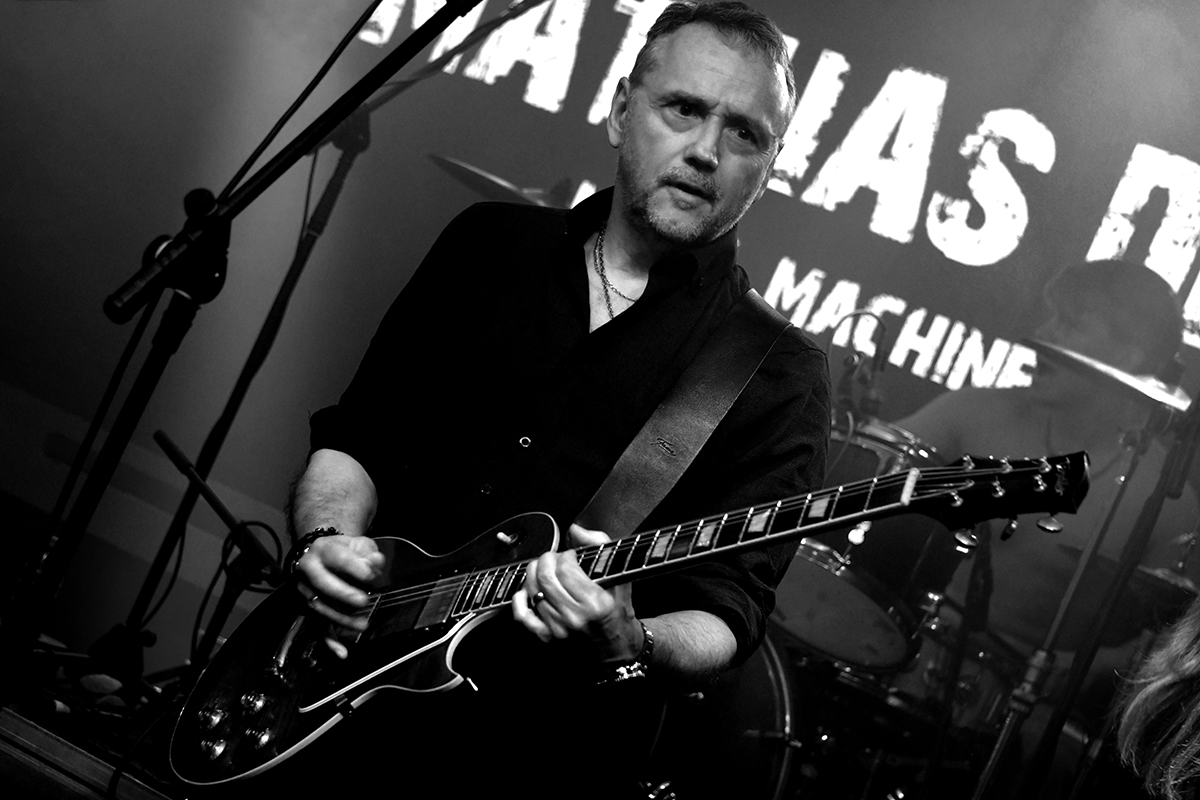
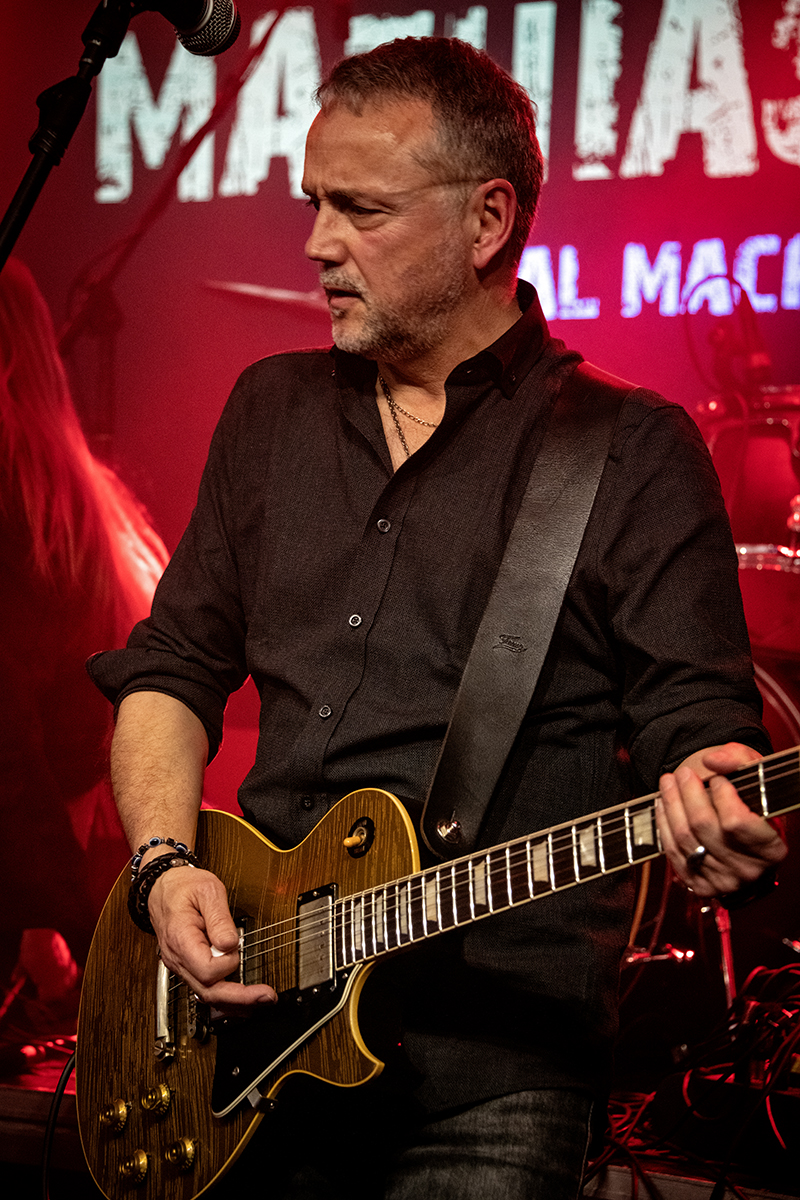
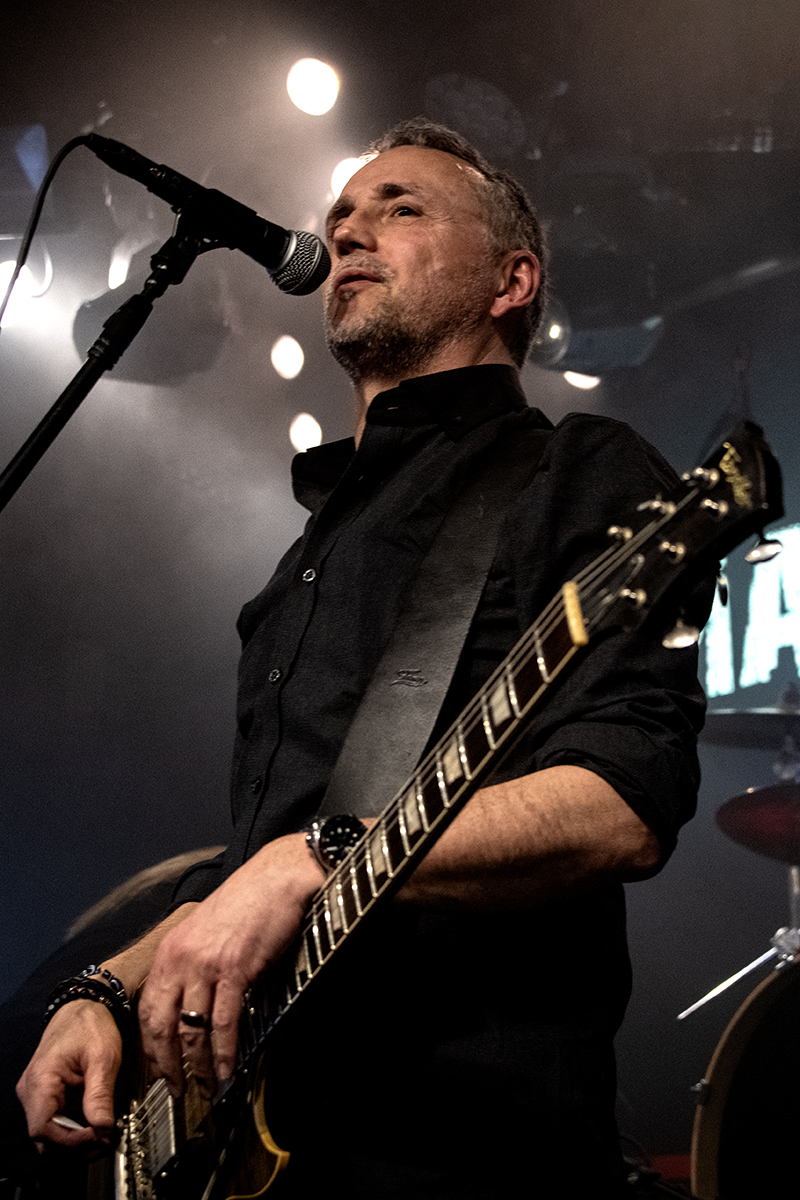
FACELESS WORLD
The next U.D.O. album was ‘Faceless World,’ and, in my opinion, it remains the best album you’ve ever done.
Mathias Dieth: Absolutely, ‘Faceless World.’ You’re spot on, and I completely agree. Just last week, I had a conversation with Stefan Kaufmann, and he mentioned revisiting that album. Every now and then, he puts it on, and he takes maybe a glass of wine and immerses himself in the memories. Creating that album was hard work, but the songs truly shine. Stefan’s compositions are top-notch. I also had the chance to contribute to a few tracks. Even today, I enjoy listening to it—it has aged gracefully. The production might not be cutting-edge, but you can still appreciate its sound, especially when compared to more contemporary releases.
I vividly recall that ‘Faceless World’ marked the first time I was the sole guitarist, handling all the guitar work. It gave me room to explore and hone my skills. Stefan was a demanding taskmaster in the studio. He had these pictures we had made in the studio where I looked quite worn out, and he really pushed me hard. But you know what? I learned so much during that production. We had moments of incredible creativity because we both respected each other’s abilities. Stefan isn’t just a drummer or guitarist—he’s a composer and a producer, and he understands technique, harmonies, and music theory. My background in jazz also helped. We reached a level where we challenged each other, bouncing ideas back and forth. Admittedly, the process wasn’t always easy, but the results were nothing short of fantastic.
Musically, it’s an excellent album, and at the same time, you used a lot of then-modern technology. It diverged from the traditional heavy metal sound of its predecessors.
Mathias Dieth: We did some things that were not very common in a classical heavy metal world. We used keyboards. We liked synthesized brass sections and similar elements. “Faceless World” incorporated synthesized brass-like sounds alongside the guitar riffs. It was all organized and arranged as you would do with brass lines and harmonies. I learned that brass sections are often arranged in intervals of seconds. We loved that, but it wasn’t like classical metal. Some people say it’s a commercial album, but we didn’t intentionally aim for commercial success or to sell more records, unlike Accept’s attempt with “Eat the Heat.” It just happened naturally while we were having fun playing music, as we do with Dirkschneider And The Old Gang. Now, it’s pretty much the same thing. We tried it, and I think it was also Stefan’s first album as an independent producer. Udo trusted him completely, which isn’t always the case with every producer, I think. Stefan used his freedom to realize some of his musical ideas that he couldn’t explore elsewhere, especially with Accept. He also gave me some freedom, and that’s how it turned out. It wasn’t a deliberate choice; it just unfolded that way, and Udo loved it, too.
One very special aspect of “Faceless World” is the background singing, which I did. I remember going to the doctor twice because my voice gave out, as I wasn’t a trained singer or anything like that. I think I’m a bad singer, but… My voice doesn’t sound good when I sing alone. I do some singing on demos, and for the actual singer, I’d say, “Just try this. This is the idea.” Stefan had me do the background vocals, covering both the highs and lows. I learned a lot from that experience. Later, we didn’t approach it the same way with the “Timebomb” album—it was a different world by then.
How much did you actually tour for “Faceless World”? I remember that you didn’t play any shows in Scandinavia on that tour.
Mathias Dieth: It was during the fall of the Berlin Wall when we worked on our album, ‘Faceless World.’ The year was 1989, specifically November. The album itself was released in the early 1990s. Our headliner tour took us to Germany, and we also had a few shows in France, Switzerland, Austria, and Italy. In England, we played at the Marquee Club, which was a wonderful experience. You are right, and we didn’t perform any shows in Scandinavia during that period. It remains a mystery to me why. Perhaps the audience lost interest, or maybe the record company wasn’t fully behind us. It’s hard to pinpoint the exact reasons. Finland, on the other hand, has always been fantastic for us.
I remember that we then had a promotional tour across Europe with Udo. Us two. We traveled to major cities throughout Europe for a week. Helsinki left an impression, although there were some less pleasant memories involving Russian vodka… Unfortunately, Scandinavia missed out on our performances, and I can’t quite explain why. Maybe conflicting schedules, or maybe ticket sales weren’t strong enough. I’m not sure. Around that time, the music industry, and hard rock music in particular, was undergoing significant changes. The tremendous shift was just around the corner, and heavy metal was becoming somewhat old-fashioned. I’m referring to the rise of the bands like Nirvana and similar movements. It was on the eve of that transformation.
Do you have any memories of shooting the video for “Heart of Gold”?
Mathias Dieth: Absolutely. I recall the song “Heart of Gold.” Interestingly, it stands as the only official U.D.O. video we ever created.
But you had also shot a video for “Break the Rules” earlier.
Mathias Dieth: Yes, but that was a low-budget video shoot in a garage. We created that one in Cologne, and I would say it was a semi-professional video. In contrast, the ‘Heart of Gold’ video is a truly professional production. We filmed it in London at an old cinema that had previously burned down. Great location. Our film team was well-prepared, and our English manager at that time meticulously organized everything. The resulting video is quite impressive. It captures that era with a unique singer like Udo and a group of long-haired guys attempting to exude a heavy, classical European vibe. However, the grunge era soon followed, characterized by short hair and long sideburns. It was during this time that I realized it may be time to step away from music.
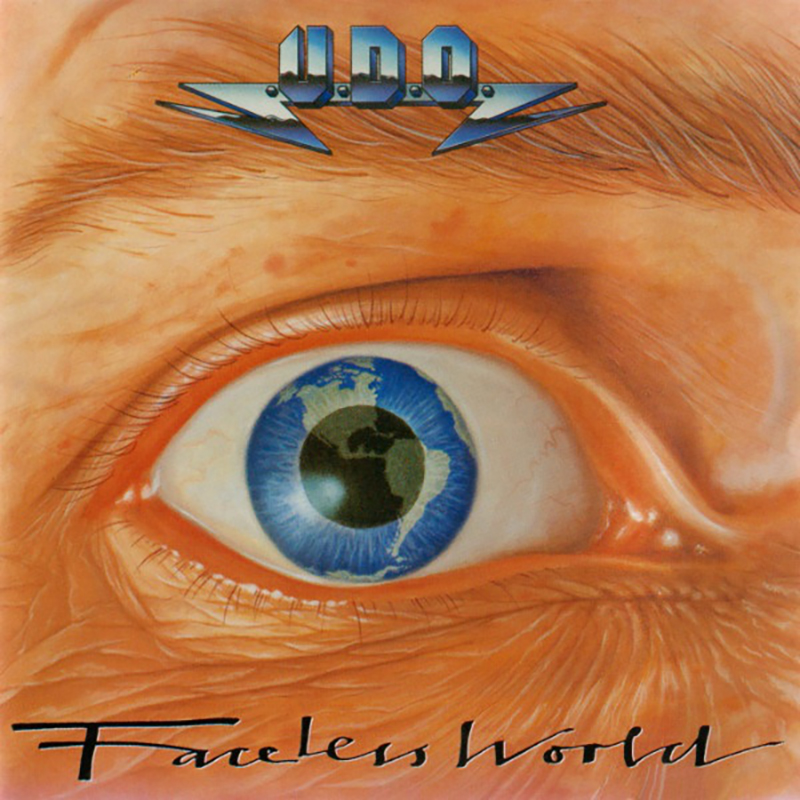
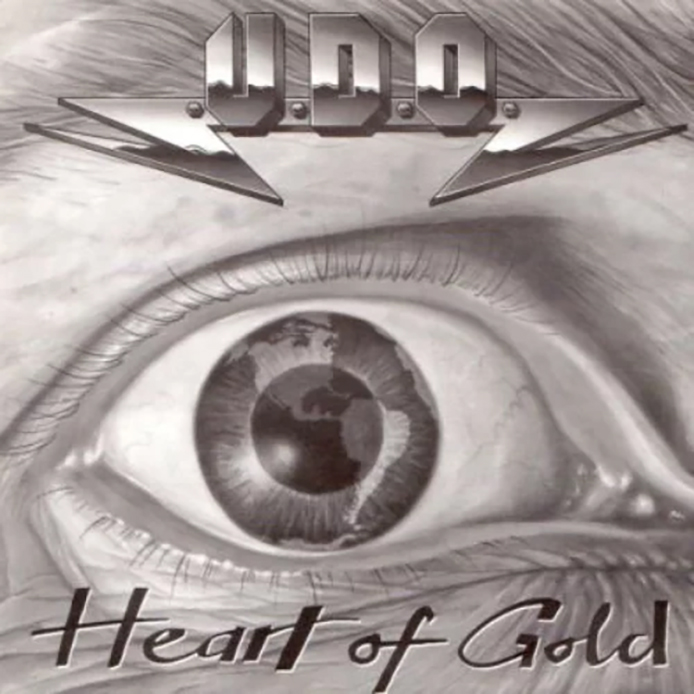
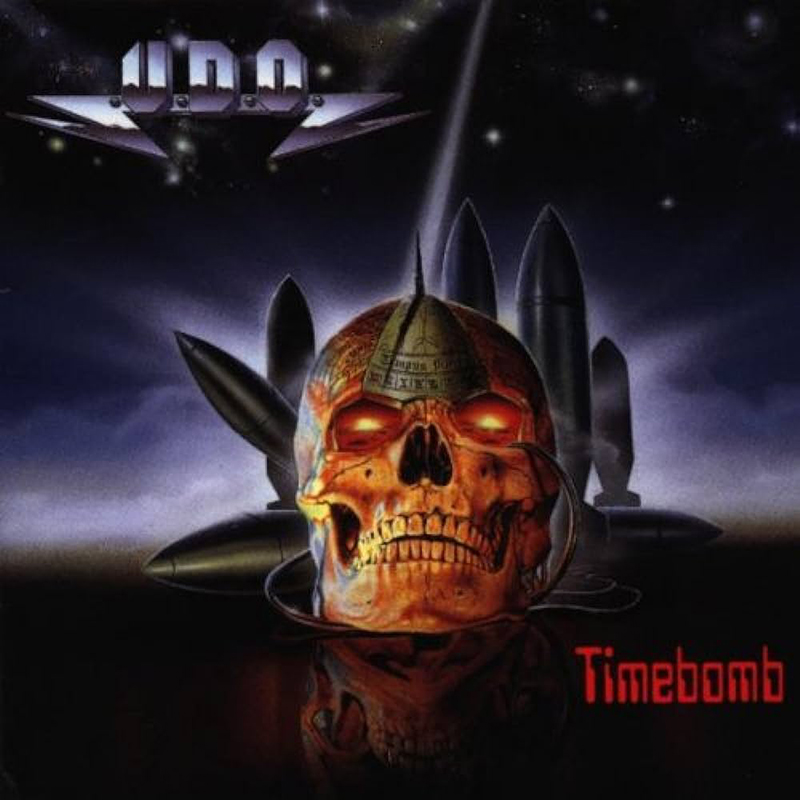
TIMEBOMB AND THE END OF AN ERA
During the recording of the ‘Timebomb’ album, have you already decided that this would be your final endeavor in the music business?
Mathias Dieth: Not when we were recording “Timebomb.” But I can say that after “Timebomb” was released, I realized that times were getting harder. I love that album—it’s a great album —it’s truly remarkable. However, listening to the entire album is difficult for me because it’s so incredibly intense. It lacks the playful ease of ‘Faceless World,’ where it felt like kids experimenting with music. Instead, ‘Timebomb’ is all about aggression.
Why does ‘Timebomb’ stand out so much compared to the other U.D.O. albums? It’s because we were all going through a tough period. Udo had suffered a minor heart attack during the ‘Faceless World’ tour. And we were thinking like, “Maybe we should revisit our musical roots.” Thankfully, it wasn’t a severe situation, and we recovered swiftly. It was during that time when our expectations and hopes for the success of ‘Faceless World’ weren’t particularly high—hence why we didn’t perform in Scandinavia, as you mentioned earlier. We contemplated returning to our heavy metal origins—that was Udo’s perspective. Additionally, having Stefan Schwarzmann and Bodo Smuszynski involved in the songwriting process was another contributing factor.
For instance, the song “Timebomb” is based on Stefan Schwarzmann’s ideas—he’s the drummer. He was the most heavy metal guy you could imagine at that time. Nothing was fast enough, hard enough, or loud enough for him. His and Bodo’s influence held immense sway, and it left a powerful mark.
And one thing must be said honestly: another influence on this album was Judas Priest’s “Painkiller.” I know Stefan Kaufmann is a huge Judas Priest fan, and I love Priest, too. I remember when “Painkiller” came out, I bought it and went to Stefan Kaufmann’s house, waking him up at 10 a.m. We didn’t live far from each other. When he answered the door phone, he grumbled, ‘I’m still sleeping. What the hell do you want? You gotta have a good excuse.’ I exclaimed, ‘I’ve got Judas Priest’s ‘Painkiller.’ You need to wake up and listen to this!’ The impact was profound; we were utterly blown away. “This is the metal we’re going to do for the ’90s. This is a sun going up!” It was like a rising sun (, although perhaps not for U.D.O. in the longer run). So this also influenced why this album became what it became. I’ve read people saying that it’s like “Painkiller.” Yes, that is true, but we didn’t want to copy “Painkiller.” We just liked that attitude, and we consciously and subconsciously adapted a lot of it.
I find it interesting that first Judas Priest shifted from the machine-driven pop metal of ‘Turbo’ to the powerful heavy metal of ‘Painkiller,’ and you then achieved quite a similar transformation when moving from the style of ‘Faceless World’ to ‘Timebomb.’”
Mathias Dieth: Yes, you’re absolutely right. Initially, I didn’t view it from that perspective, but there’s indeed a parallel. Despite the distance, it still harks back to our roots. In our small U.D.O. world, we followed a similar path, although we can’t be directly compared to Judas Priest. Perhaps this serves as a sign and proof that beautiful heavy metal was in jeopardy during that time. The drive to survive led us back to a heavier sound.
As you mentioned earlier, the ‘Timebomb’ tour concluded here in Finland. At what point did you tell Udo that you are planning to quit?
Mathias Dieth: Basically, it was my decision to quit music before that last show in Finland, but I didn’t tell anybody. I kept it to myself. I had made a decision, and for me, it was clear: if I couldn’t make a good living from music until I was 25, I would pursue something else. That was my plan. We had a good life with U.D.O., and I was 27 then—not 25. So, I continued for two years longer than originally planned. Unfortunately, during that period, we lost our record deal thanks to the rise of Grunge and other factors. Nobody believed in our type of music anymore. Our record company shifted its focus elsewhere, as did everyone else. We were faced with the reality of finding a new record company, and on one hand, nobody knew what the future held. On the other hand, there was the looming shadow of Accept—a magical, dark presence—over the band.
After that show, I told Udo, ‘I have to quit. I must.’ His response was, ‘Okay, let me share something with you.’ While I don’t recall his exact words, in his mind, the Accept reunion was already brewing—it felt like a natural progression. There were rumors concerning Accept: ‘Will they reunite? What will they do?’ It was evident that something would happen. For me, the decision was clear: ‘I wouldn’t want to be part of that. And – I didn’t want to be the guy who approaches record companies with demo tapes after U.D.O., asking, ‘Could you give me a deal or something?’’ I felt that I had simply reached my limit.
It wasn’t a dramatic split where we all sat down together, saying, ‘Now we part ways. Take care, guys. Goodbye.’ It was a respectful transition. It felt as if I no longer wanted to continue, and Udo felt the same way. The other band members shared that sentiment. Our next endeavor was the idea to form a new band as a test. Alongside my decision to pursue university studies and become a lawyer, Stefan, Bodo, and I had two or three songs that we attempted to collaborate on with Leon Geowie from Vengeance, a Dutch singer. Although he expressed interest, he never materialized. And so, I embarked on my studies. I must admit, I loved it. I embraced this change in my life wholeheartedly. I declared, ‘Okay, no more metal. I am no longer a metal player.’ Consequently, I quit playing the guitar altogether and remained guitar-free for about 20 years.
After U.D.O. disbanded, rumors circulated that the Accept members asked you to join their new lineup. Is there any truth to that rumor?
Mathias Dieth: Indeed, there was a discussion. I know that Udo would have loved the idea, and he would have supported it. Stefan would have been on board as well. We had conversations about it, and I expressed, ‘I don’t want to do this because I don’t want to be the sideman standing right next to Wolf Hoffmann.’ After all, there’s already a wolf in the woods; there’s no room for another one.’ Later, I reconsidered slightly, but since I was deeply immersed in my studies and enjoying them, I ultimately decided against it. If my studies had been a nightmare, perhaps I would have made a different choice. However, I’m certain I would have regretted it later. Regardless, I have no issues with Wolf, and everything is fine. But to be honest, I would be much too short to stand next to Wolf—he’s like two meters tall and I am a rather short guy. Just imagine how that would have looked!
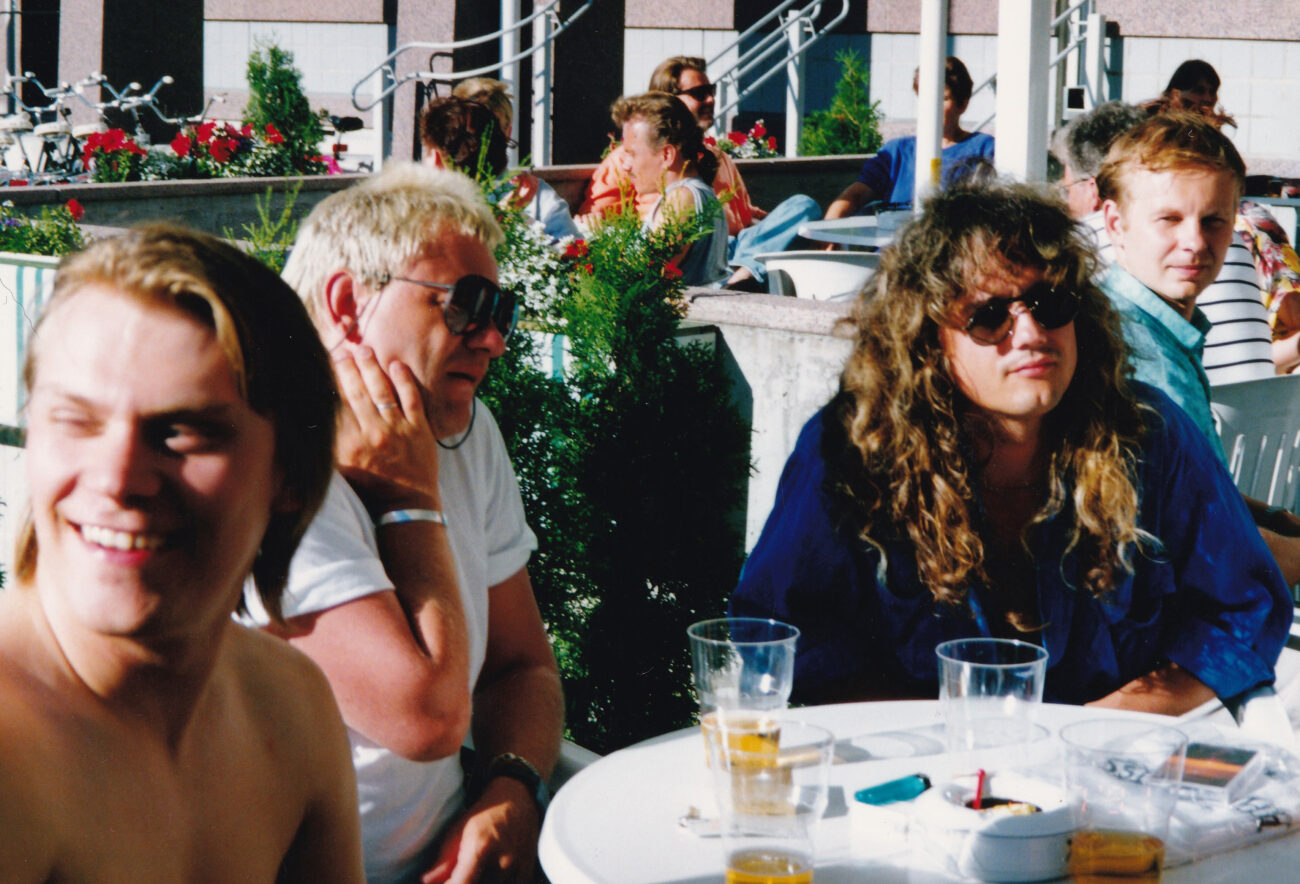
ALL PLANET EARTH ALIAS APE
Also, after the U.D.O. thing, you put out one album with the band Ape.
Mathias Dieth: Ape, yes, or All Planet Earth with Emil Brando. What was that all about? The album cover is funny. Sometimes I thought, if I’m a lawyer and somebody sees this album cover, what will I say? Everyone who knows it says, “Wow, it’s great, funny.” This is not something to be taken too seriously. The story behind it is Emil Brando, a fantastic bass player from Los Angeles. He was in Dierk’s studios with Joshua Perahia, who was a guitar player from the US too. They made an album, and we knew each other then. Emil had a German girlfriend, and he then moved to Germany. When we were looking for a new bass player, he auditioned with U.D.O. He was a fantastic player, but Udo said, “I don’t want an LA player in my band,” which was a good decision. Emil had a friend called Christian Pfannschmidt, who is a drummer and a brand guy from a digital drum company, more into very digital things. He had a studio at home, and they were friends. Emil wanted to record some songs. He phoned me up and said, “Would you like to play some guitars?” Those were his songs, not mine. I just went there and played a couple of guitars in two days. Then, we had eight or nine songs. Afterward, he said, “I need another guitar player.” That was Andy Susemihl, the old guy from U.D.O.’s “Mean Machine” era. He came in and played some stuff, too. That is the story behind it. That is all. Emil sang all the tracks on the album; I don’t think he is the world’s best singer, but it was a fun project, and he did well. Emil Brando was the mastermind behind it. I like the roughness of it. Sometimes, I listen to it, and I think it’s like a well-produced demo for that time.
You only did that one album, and that was it?
Mathias Dieth: Yes. There were not any shows, nothing.
The ‘Ape’ album marked your departure from the music world for quite some time. However, you always maintained a connection with Udo, and you made several guest appearances on his later albums.
Mathias Dieth: Yes. Sometimes, I showed up, and he asked me to play. I remember one night when I had to play a solo on a song called “Hardcore Lover.” I was here and there with Stefan Kaufmann; I played some guitar, and he used some old stuff that we had written together in those old days. I remember one night playing that… What was that song? Something with the devil.
Do you mean “Devil’s Rendezvous” from the 2009 “Dominator” album?
Mathias Dieth: Yes, that one. Great song. I remember I was not very skilled then because I was totally out of playing and the music stuff. I remember coming from my law firm after a long day’s work, then sitting in the studio with Stefan Kaufmann, and those faces were there. I felt as if I could barely move my fingers. That was a really hard time, but we managed to make it in the end. It felt kind of rusty, but the connection was never completely lost.

GRAVESTONE
You finally returned to the concert stages with your old band, Gravestone, which had a reunion. Was this in 2019?
Mathias Dieth: Yes, it was five years ago, in 2019. We played some fantastic shows in Southern Germany.
Is it the right thing to say that Gravestone was your first professional band in the early ’80s?
Mathias Dieth: Gravestone wasn’t fully professional; it was more semi-professional. It was my first band where we recorded albums, and I was about 19 or 20 years old. We released two records with a German label and toured across Germany, playing a little tour in 1985 and various festivals. This was during the early days of German heavy metal, alongside bands like Sinner, Running Wild, and Axxis. While Gravestone didn’t become hugely famous, I still think we were one of the stronger bands then. Our guitar team was solid, and “Doc” Reinelrt, my fellow guitarist, remains a fantastic player even today.
Why did you decide to make a comeback with Gravestone after so many years away from music?
Mathias Dieth: Because all the time, we all get older. We are all in our late 50s now, some even in their 60s. Obviously, your kids have grown up, and they even have left home, maybe. They do not need all this support and all the efforts you put into them, so there is more free time. People, this was my experience, especially with Gravestone; those people in the South who knew us from the days in the ’80s were eager to hear us and to get this feeling back. It is old stuff. When we play with Gravestone, I say we’re not a heavy metal band; we are an oldies band playing heavy metal. It is like a big meeting for people who have known us for years. And we are working on some new songs now, great material, in the manner of the old stuff. We’ll see how this unfolds. It’s a time when classic heavy metal is making a comeback for those who cherished it in the past. It would be great to attract also new, younger fans with this music.
Now that you’re older and your kids have left home, you have more time for yourself. Interestingly, the same thing holds true for your old fans. They can also now relive the old days because they, too, feel a sense of freedom from their past obligations.
Mathias Dieth: Yes. They can put on their CDs and listen to the old stuff, and then their kids will say, “Daddy, what crap are you listening to?” But it’s not always like that. I went to see Doro’s show the other day. I was invited to her 40th Anniversary show, and we went with the family, including my son. And he liked it a lot.
Those Gravestone albums were re-released on CD a couple of years ago, right?
Mathias Dieth: They were eventually re-released on CD in 2005. The first album is “Victim of Chains,” first released in 1984, and the other is “Back to Attack,” first released in 1985. At that time, a group of young people from the German South were trying to create heavy metal in a studio. With Berti Majdan, we had an outstanding singer.
While listening to those Gravestone records, another band came to mind. Oddly enough, it’s not a German band, but somehow, Lizzy Borden came to my mind.
Mathias Dieth: I must admit that I know Lizzy Borden by name, but I’ve never heard any of their songs. Maybe they had heard ours, “Ha, ha!”
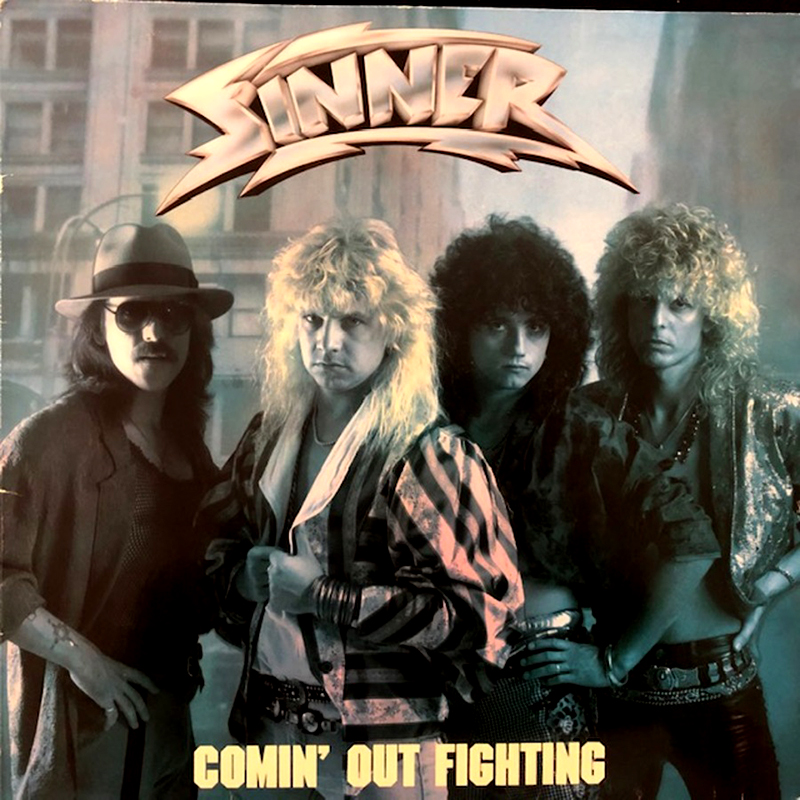
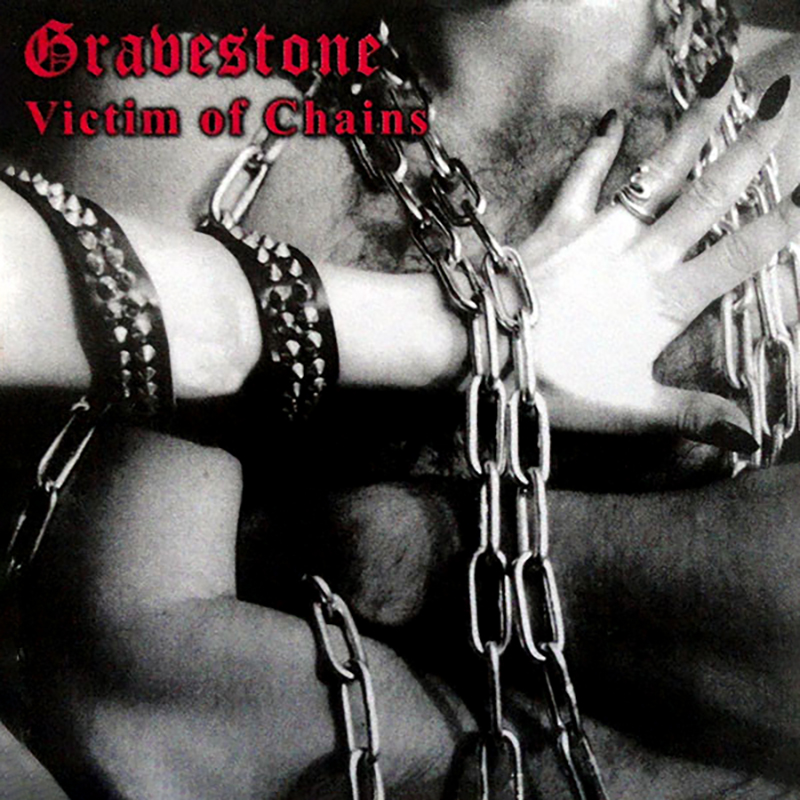
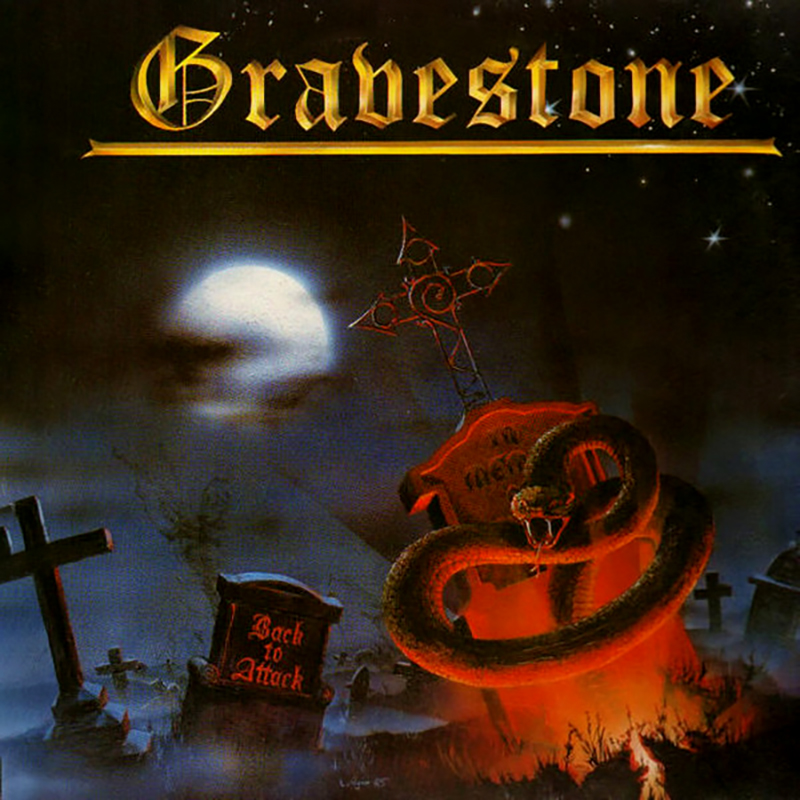
After you had parted ways with Gravestone, you briefly joined Sinner and recorded “Comin’ Out Fighting” in 1986.
Mathias Dieth: I left Gravestone because of internal problems like you always say; I specifically quarreled with Berti, the singer. I had the same thing with Berti that Wolf and Udo had between them We did not talk to each other for 30 years. Today, we both cannot remember why. When you get old, you search for peace and not for war. Sinner was quite an enjoyable experience because it was the first rather professional band and the next level from Gravestone. Mat Sinner is an incredibly good composer. He knows very clearly where he wants to go. It was rather commercial music, which I did not like much in all its facets. My time in Sinner was not that long. When Udo called, this was a change in all aspects.
Udo called me because Dirk Steffens had told him about a guitar player in southern Germany that he knew from mixing the Gravestone album “Back To Attack.” Our Gravestone bass player, Thomas Sabisch, and I had been to Hamburg to be in the studio with Dirk Steffens when he was mixing. Dirk Steffens had been the producer of Accept in their very early days. When Udo was looking for new musicians, he also asked Dirk Steffens, and he told Udo about me. Then, one day, he called me. That was the end of my time with Sinner.
Your musician career progressed rapidly during that period.
Mathias Dieth: Yes, you could have the impact that every door that goes up, “Mathias Dieth is trying to go there.” It’s not like that. Udo’s band was a real chance. It was the bloody best thing a young German guitar player in rock music could have at that time. There were professional circumstances. I got money, not much, but money to pay the rent and to pay for the fuel for the car to drive from Cologne to Düsseldorf for our rehearsals and everything. I quit my first studies (economics) in Stuttgart and said, ‘I go to Cologne and join U.D.O. professionally.’ That is what I wanted. I also would have liked to have more success with my original friend’s band, Gravestone, but that was not possible because not everybody was in the same mood. It’s like in bands, where one says, ‘No, I cannot practice for the next four weeks because my girlfriend says I must be at home more,’ then you cannot go far. This is the reason why things went as they went.
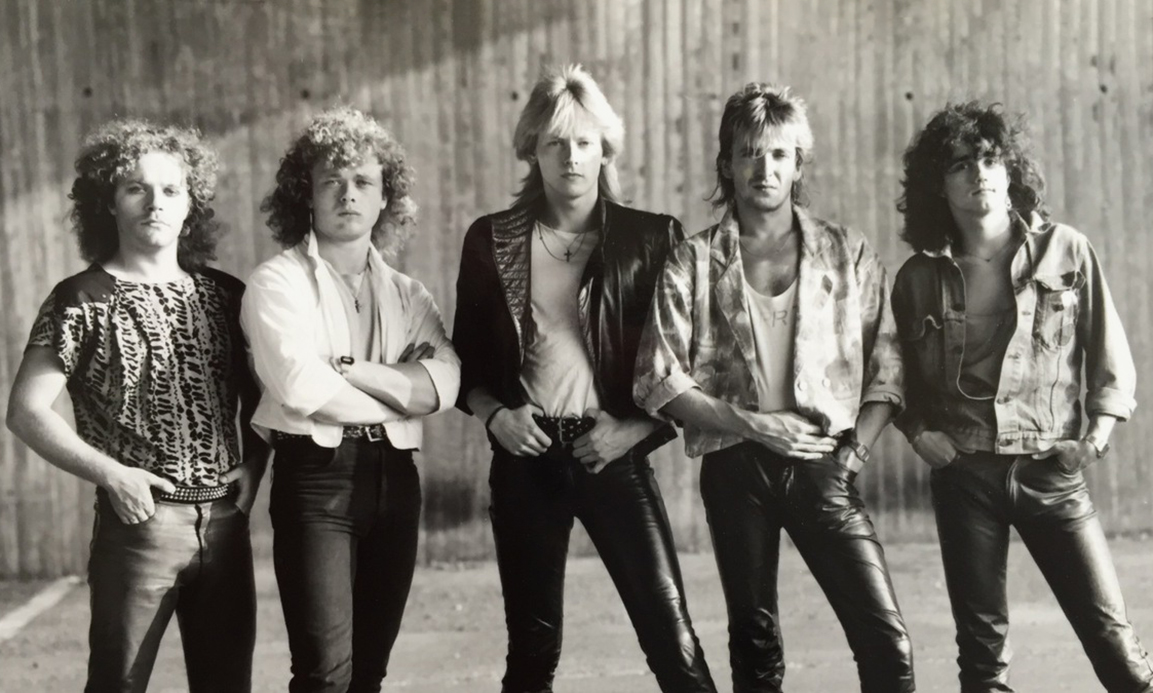
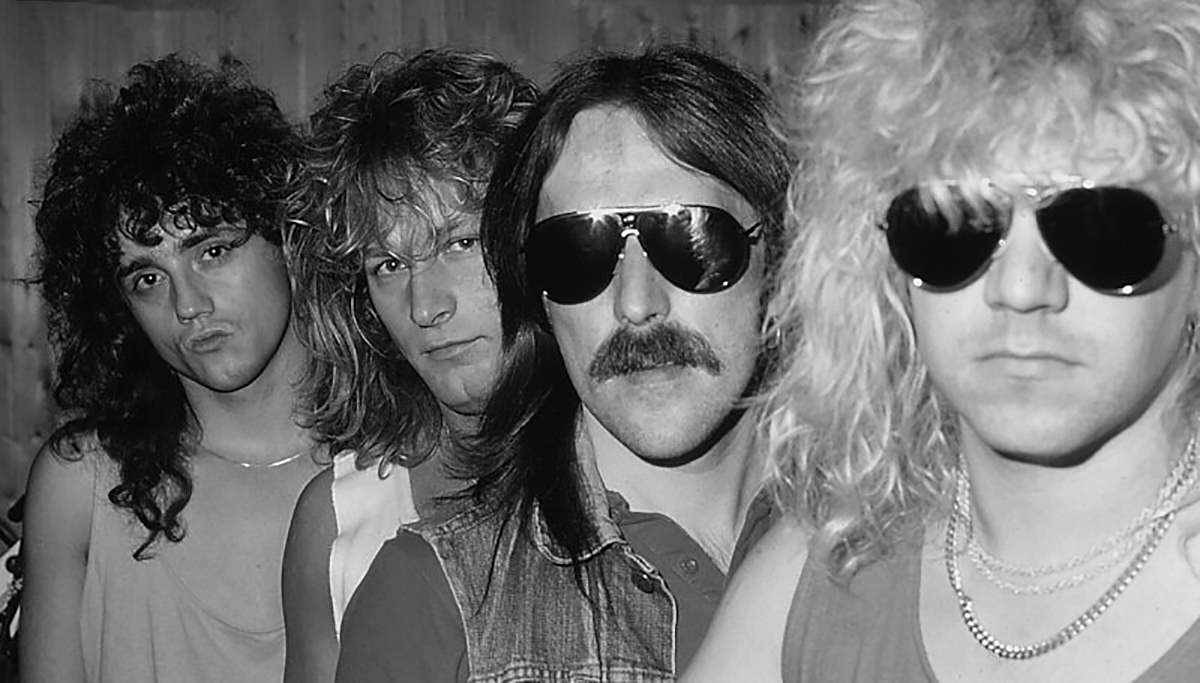
TIFFANY KILLS
Gravestone is now back, but you also play actively with Tiffany Kills. I know that the band’s singer is John “Jaycee” Cuijpers, who is presently also a singer of Praying Mantis.
Mathias Dieth: Yes. Tiffany Kills is a great new band with great guys and a great additional female singer, too! And Praying Mantis is also an oldie band that produces great music. Jaycee makes a lot of tribute material, including ABBA tributes and rock versions of ABBA songs. Quite interesting! He is a very busy guy in the Netherlands.
Tiffany Kills is a project involving a group of Germans and a bunch of Dutch musicians. We have four shows lined up for May, including two shows with Tyketto, which is another reloaded band from the United States. We’ll be performing together in the Netherlands during spring. Additionally, we’re working on a new album of original material, which we plan to release this year—specifically in the summer. Interestingly, we’re doing it without a label because we don’t feel the need for one. The main person handling production is my friend Christian Tolle, who also has the Christian Tolle Project (CTP). He’s not only a musician but also a journalist; however, his primary profession has been investment banking. He’s an incredibly skilled guitar player and contributes to the German guitar magazine ‘Gitarre und Bass.”
We wrote songs together, and he knows Jaycee well, as they used to work and play together in the ’90s—they have a long-standing connection. They had this band „Cooper Inc.“ together many years ago. Now he’s a bit tired of making his Christian Tolle Project solo albums, where also David Reece always sang two, three, or four songs on every album. Christian and I had this idea to put together an easy-going band, playing songs from his Christian Tolle Project and songs from my era with U.D.O., especially in the Netherlands. The Netherlands is more conducive to live shows than Germany because they have a vibrant live scene, rock clubs, and enthusiastic audiences who love all kinds of rock music. We tried this out and played Christian‘s songs and some U.D.O. songs. Jaycee had to sing like Udo, which wasn’t his first choice, but he’s been improving steadily. He’s brilliant, and it’s a lot of fun. We had a couple of shows last year, and as I said, more are lined up for this year. We even have a booker now for the Netherlands. Tiffany Kills is a well-tasting blend of hard rock, metal, and rock with some blues influences. It’s what we older guys love!
I have seen some Tiffany Kills video clips on YouTube.
Mathias Dieth: There is plenty of stuff on the web. It is a mix of our cool things. I’ll keep you posted; whenever something is finished, I will send it to you.
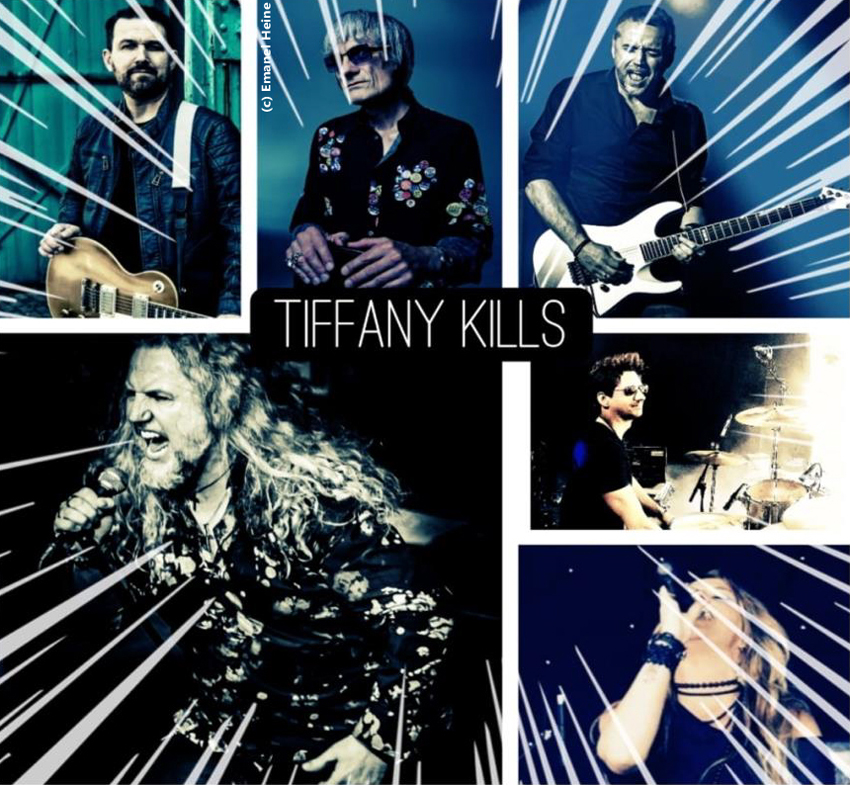
DIRKSCHNEIDER AND THE OLD GANG
One of your current active projects is an interesting supergroup, Dirkschneider and the Old Gang, which consists of, as the name suggests, former and current members of U.D.O. and Accept. How did that band or project (DATOG) come together?
Mathias Dieth: I was the last one to join that project. It originated from the collaboration between Stefan Kaufmann and Peter Baltes with Udo on the U.D.O. album called “We Are One”—a project involving a German orchestra, Musikkorps der Bundeswehr. This project also featured the female singer Manuela Bibert. It marked the first time Udo and Peter Baltes had reconnected after years. They had this album out, and there was one song left—this was during the Corona pandemic. The song in question was “Where the Angels Fly,” which I believe was initially intended to be part of the album, albeit in a different version. Then Udo, Manuela, Sven, and Stefan created a video for “Where the Angels Fly,” which they uploaded to YouTube. It was an experiment to gauge its reception. And it went very well—there were plenty of clicks. The record company took notice, and the idea of doing more projects emerged. That’s when the concept of DATOG came into play.
They had Udo, Stefan, and Peter Baltes on board—Peter had recently left Accept. Sven, Udo’s fantastic drummer son, was also part of the mix. And then there was the intriguing and fabulous singer Manuela, originally from Kazakhstan, who possesses a versatile vocal range. This unique blend of talent led them to seek a guitar player. Martin Pfeiffer, Udos Producer for many years, suggested considering someone they’ve worked with before. Martin said to Stefan and Udo, “If you’re assembling all these old guys, you can either ask Wolf Hoffmann, and the reaction is clear, or you must choose someone different. The only one I know is Mathias.” They mentioned that he’s now a lawyer. The question arose: “Can he still play?” Then Stefan called me and invited me for dinner. Stefan loves to cook, and he prepared a big steak and everything.
We had a nice evening and talked about this and that. In the end, he asked me whether I would consider joining this project. I said, “Why not? Of course!” And he said he had thought that it would be much more difficult to convince me. I like this project very much because, like on “Faceless World,” you can play with all this stuff. It’s not a band where a record company expects something specific or where you are limited by your specific history and expectations. Of course, it must be good music, heavy music, and everything. But, besides Udo being unique as ever, you have this female singer Manuela, and Peter Baltes is also singing—he’s a really great singer. He sang some Accept songs in the very beginning. Udo is fine with all this, totally relaxed. We have Sven as the drummer. This is where I can contribute my stuff, and that’s how this project started. We put out this three-song EP, “Arising.” Yes, I understand that many people were disappointed not to have a whole album. I apologize for that. It was all that was possible for us to make during the pandemic. Now we’re working on a full album; we’ve already done some recordings. I love it. I must say what everybody says, like in interviews: this is going to be one of the best things I’ve ever contributed to. It will turn out great.
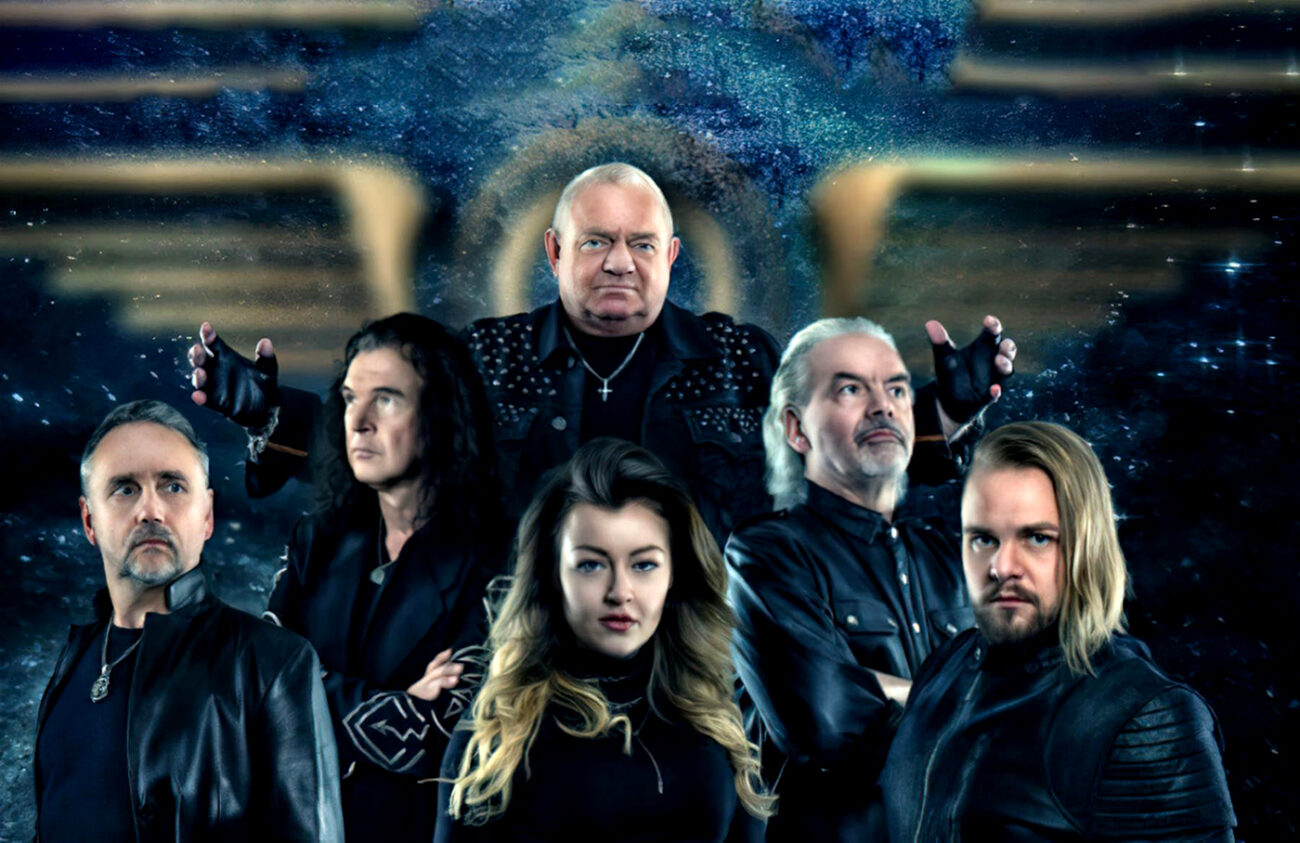
I recall when you released the video for ‘Face of a Stranger,’ which introduced the DATOG band for the first time. The video featured six frames, each showing a player’s face, but one frame remained dark until the guitar solo began. That’s when your face also appeared in the empty frame. So, you were the ‘Face of a Stranger’ in that video.
Mathias Dieth: That was Stefan’s idea. He said, ‘I’ll do this like this.’ We have a head. They had this first song out, ‘Where the Angels Fly.’ The second song was something new to be a worldwide release on a YouTube video at a certain time. I was sitting at the computer also. I was incredibly stressed about the first comments. I did not know what to expect. Saying, ‘This old guy, what he’s playing the guitar, maybe he should stick with his law firm.’? However, the directions were different, which made me happy. That was Stefan’s idea with this. I said, ‘What does that do?’ I just play the guitar. He: ‘You’re an important person in the video, and you will be introduced by this.’ This is something I must relearn a bit. To be honest, I’m not fishing for compliments, but it’s like this. It was quite difficult to keep my contribution a secret before the video was released, but I think it was kind of a nice surprise.
When your colleagues at the law firm learned about this project, what feedback did they give you?
Mathias Dieth: I showed the video to them, and they were impressed. They said, ‘Okay,’ but still, ‘Are you going to do your work, don’t you?’”
Of course, it’s a bit too early to ask this, but have you been discussing the possibility of the band playing some shows once the album is released?
Mathias Dieth: There’s nothing concrete at the moment. It would be difficult to put this on a stage for me with my law firm and other commitments, but it’s not impossible. However, there are no plans for any tour or something like that. Perhaps a one-off festival show where I could imagine if U.D.O. puts on a performance, and then there’s this special event when he celebrates his 90th birthday or something like that. No, just kidding. This is something that could be considered. Yes. I do not know anything concrete. Once the album comes out, perhaps a special show around that. Maybe at the end of 2025?
I’m glad that you’ve reconnected with the old gang. You mentioned the connection was never lost, but this project is likely making it even stronger. It’s also fantastic that Udo and Peter are collaborating again. If Peter were still in Accept, this project wouldn’t have been feasible due to the strained relationships between Udo and Wolf.
Mathias Dieth: It’s unfortunate, isn’t it? Honestly, I can’t quite grasp what’s happening between them. As I mentioned, I don’t have any issues with Wolf, but our connection isn’t very strong. I remember the days when it was clear: David Reece was part of this, and Udo was part of that. There’s definitely something going on between Udo and Wolf, although I don’t have all the details. So, I choose to stay out of it. As people age, old memories resurface. This is probably true for Udo and Wolf, as well. Past wounds aren’t fully healed; they resurface. But this is none of my business.
Mathias, I think we have now covered everything. Is there anything you would like to add still?
Mathias Dieth: I think we have covered everything now. Thank you once again, Marko.
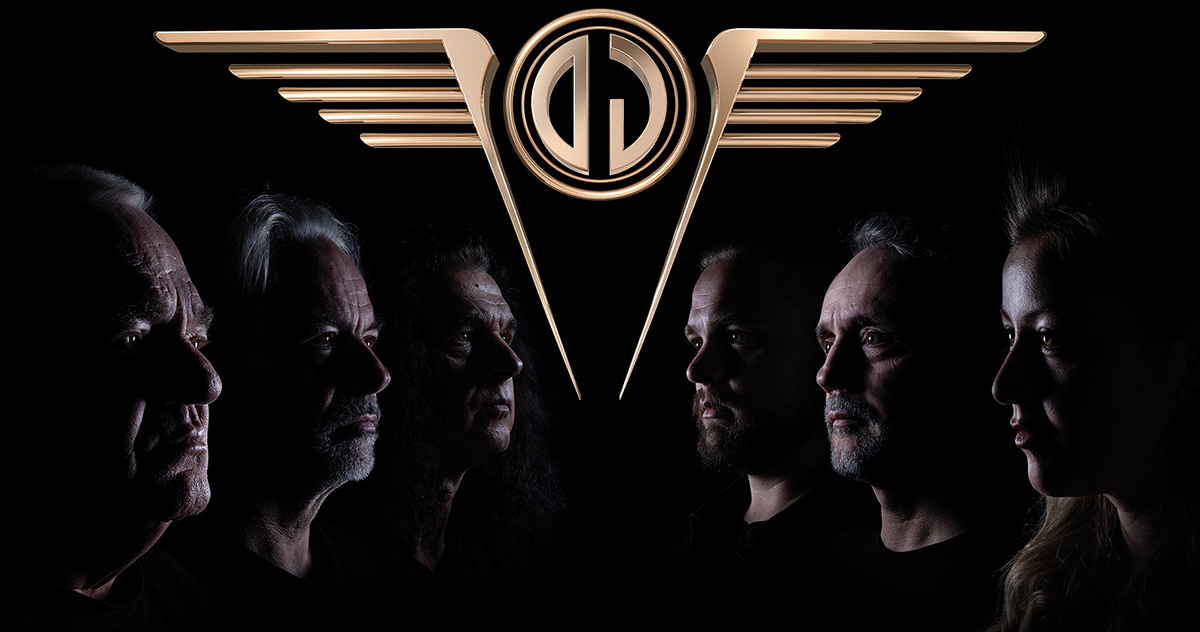
WEBLINKS
MATHIAS DIETH OFFICIAL FACEBOOK PAGE
PROMO VIDEOS